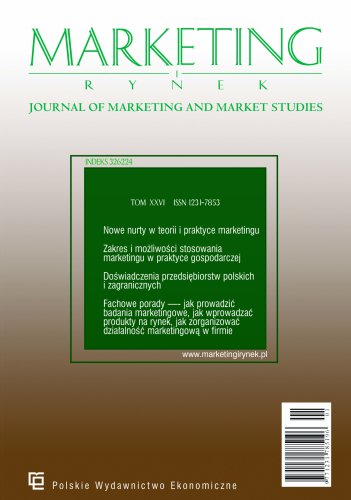Intelligent technologies in marketing and sales - applications, research areas and directions
Marketing automation is a combination of software and business strategy. Enables you to educate and nurture potential customers using highly personalized, useful content that helps transform potential customers into company's satisfied customers. Marketing automation software identifies potential customers and then directs the appropriate personalized marketing message to them. The program automatically prepares offers and advertising content and sends them to a specific group of customers, based on the previously created contact database. The purpose of this chapter is to discuss the functions, expected effects and products of marketing automation, RFID and Internet of Things (IoT). The integration of inteligent technologies means that information for decision-making processes can be delivered from the entire supply chain and products identified in the RFID network, as well as from customers. The article indicates research directions of the scope of using marketing automation and sales platforms in enterprises. In recent years, despite the growing interest and increased use of intelligent technologies to automate sales and marketing processes, there is a surprising lack of research on how and why marketers use these platforms. This gap in knowledge can be filled by research to better understand who uses intelligent technologies, for what purpose and what are the conditions for success in implementing these innovative information technologies. The author assumes that dominates the review and conceptual nature of this scientific study.
References
Bibliografia/References
Aalst van der Wil, M. P., Bichler, M. i Heinzl, A., (2018). Robotic Process Automation Business & Information Systems Engineering, 60(4), 269–27. https://doi. org/10.1007/s12599-018-0542-4
Błażewicz, G. (2012). Marketing Automation — Nowa Szkoła Marketingu. CEO Benhauer & SALESmanago Marketing Automation.
Bucklin, R., Lehmann, D. i Little, J. (1998). From decision support to decision automation: A 2020 vision. Marketing Letters, 9(3), 235–246. https://doi.org/10.1023/A: 1008047504898
Błażyńska J. (2016). Jakość informacji o sytuacji finansowej jednostek gospodarczych. Zeszyty Naukowe Uniwersytetu Ekonomicznego w Katowicach, (248).
Gualtieri, M. (2017). Artificial Intelligence: What's possible for Enterprise in 2017, Forrester Turning AI into concrete value: the successful implementers's toolkit Capgemini Consulting. https://doi.org/10.1023/A:1008047504898
Kieżel, M. i Wiechoczek, J. (2017). Narzędzia e-marketingu w procesie kreowania wartości dla klienta. Zeszyty Naukowe Politechniki Śląskiej. Organizacja i Zarządzanie, (114).
LeSueur, J. (2007). Marketing Automation: Practical Steps to More Effective Direct Marketing. Wiley.
Li, L. (2012). Effects of enterprise technology on supply chain collaboration: analysis of China-linked supply chain. Enterprise Information Systems, 6(1), 55–77. https://doi.org/10.1080/17517575.2011.639904
Liu, A. X., Shahzad, M., Liu, X. i Li, K. (2017. RFID Protocol Design, Optimization, and Security for the Internet of Things. Institution of Engineering
and Technology. ISBN-13: 978-1785613326. https://doi.org/10.1049/PBCE112E
Mostaghel, R., Oghazi, P., Beheshti, H. M. i Hultman, M. (2012). Adoption of enterprise systems and radio frequency identification among service firms. The Service Industries Journal, 32(15), 2435–2443. https://doi.org/10.1080/02642069.2012.677828
Nowakowski, M. (2015). Ocena wiarygodności informacji w serwisach internetowych. Studia Informatica, (36). https://doi.org/10.18276/si.2015.36–08
Oghazi, P., Rad, F. F., Karlsson, S. i Haftor, D. (2018). RFID and ERP systems insupply chain management. European Journal of Management and Business Economics. 27(2), 171–182. Emerald Publishing Limited. https://doi.org/10.1108/EJMBE-02-2018-0031
Oghazi, P., Rad, F. F., Zaefarian, G., Beheshti, H. M. i Mortazavi, S. (2016). Unity is strength: a study of supplier relationship management integration. Journal of Business Research, 69(11), 4804–4810. https://doi.org/10.1016/j.jbusres.2016.04.034
Rai, A., Patnayakuni, R. i Seth, N. (2006). Firm performance impacts of digitally enabled supply chain integration capabilities. MIS Quarterly, 30(2), 225–246. https://doi.org/10.2307/25148729
Rutkowski, I. P. (2014), Systemy wspomagania decyzji marketingowych. Informacje i decyzje. Technologie i zastosowania. Poznań: WSHiU.
Świeczak, W. (2012). Inbound marketing jako forma marketingu internetowego. Marketing Instytucji Naukowych i Badawczych, 1(2). Wydawnictwa Naukowe Instytutu Lotnictwa.
Świeczak, W. (2013). Marketing automation processes as a way to improve contemporary marketing of a company. Marketing Instytucji Naukowych i Badawczych, 3(9). Wydawnictwa Naukowe Instytutu Lotnictwa.
Wiengarten, F., Humphreys, P., Gimenez, C. I McIvor, R. (2016). Risk, risk management practices, and the success of supply chain integration. International
Journal of Production Economics, 171(3), 361–370. https://doi.org/10.1016/j.ijpe.2015.03.020
Witczak, O., (2014). Inbound marketing a koncepcja marketingu relacji. Studia Ekonomiczne, 182, 20–29. Wydawnictwo Uniwersytetu Ekonomicznego w Katowicach.
Wood, C. (2015). Marketing automation: Lessons learnt so far… Journal of Direct, Data and Digital Marketing Practice, 16(4), 251–254. https://doi.org/10.1057/dddmp.2015.31
Wook Kim, S. (2006), The effect of supply chain integration on the alignment between corporate competitive capability and supply chain operational capability. International Journal of Operations & Production Management, 26(10), 1084–1107. https://doi.org/10.1108/01443570610691085
Polecane źródła internetowe
https://sherpablog.marketingsherpa.com/?s=marketing+automation (28.05.2020)
https://www2.deloitte.com/pl/pl/pages/technology/articles/tech-trends-trendy-technologiczne-2019.html (14.10.2019)
https://informatykawfirmie.pl/systemy-informatyczne/systemy-pos/139-5-najlepszych-systemow-do-automatyzacji-marketingu (9.06.2020)
https://www.hubspot.com/marketing-automation-information (19.06.2020)
http://www.marketing-automation.pl/przelomowe-technologie-to-nie-przyszlosc-marketing-automation-to-terazniejszosc/ (15.06.2020 r.)
https://www.salesmanago.pl/marketing-automation/marketing_automation.htm, (15.06.2020 r.)
https://files.salesmanago.pl/Marek/ebook_pl/SALESmanago_Profil_Produktu.pdf?_ga=2.131086151.913000846.1569084896-417149880.1553945362(18.05.2020)
https: //medium. com/iotforall/the-difference-between-artificial-intelligence-machine-learning-and-deep-learning-3aa67bff5991 (10.06.2020)

